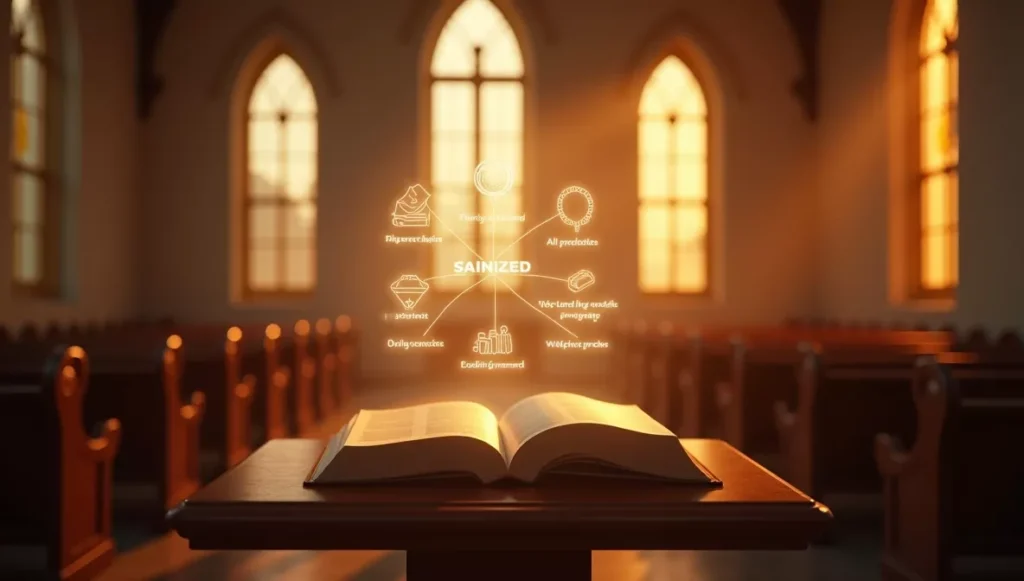A New Helper in Your Ministry
Imagine this: It’s Thursday evening. You’re sitting at your desk with a cup of coffee, and Sunday is just around the corner. You know what Bible passage you want to preach on, but the outline just isn’t coming together. Your mind feels foggy. The words aren’t flowing.
- A New Helper in Your Ministry
- What Is AI and Why Should Pastors Care?
- Understanding AI in Simple Terms
- Why AI Can Help Your Ministry
- 💖 You Might Also Like
- The Best AI Tools for Creating Sermon Outlines
- 1. ChatGPT: The Popular Choice
- 2. Claude: The Thoughtful Assistant
- 3. Sermon GPT: Built for Preachers
- 4. Jasper AI: The Professional Content Creator
- 5. Copy.ai: Simple and Straightforward
- 6. Notion AI: The Organized Planner
- How to Actually Use AI for Sermon Preparation (Step by Step)
- Step 1: Start with Prayer and Scripture
- Step 2: Identify Your Main Message
- Step 3: Ask AI for an Initial Outline
- Step 4: Customize and Make It Yours
- Step 5: Ask AI for Specific Help
- Step 6: Review and Pray Again
- Real-World Examples: AI in Action
- Example 1: The Busy Bi-Vocational Pastor
- Example 2: The Senior Pastor Planning a Series
- Example 3: The Creative Pastor Who Gets Stuck
- ✨ More Stories for You
- Common Concerns About Using AI for Sermons
- Concern 1: “Isn’t This Cheating?”
- Concern 2: “Will My Sermons Sound Robotic?”
- Concern 3: “What About Theological Accuracy?”
- Concern 4: “Will I Lose My Unique Voice?”
- Concern 5: “What Will My Congregation Think?”
- Best Practices for Using AI in Sermon Preparation
- Best Practice 1: AI is a Tool, Not a Replacement
- Best Practice 2: Always Fact-Check and Scripture-Check
- Best Practice 3: Add Your Personal Touch
- Best Practice 4: Be Transparent When Appropriate
- Best Practice 5: Keep Learning and Growing
- Best Practice 6: Protect Sermon Integrity
- Best Practice 7: Use AI for the Right Tasks
- How to Get Started Today (Even If You’re Not Tech-Savvy)
- Option 1: The Easiest Way (ChatGPT Free)
- Option 2: For Better Results (Claude Free)
- Option 3: For Serious Users (Paid Tools)
- 🌟 Don't Miss These Posts
- Simple Prompts to Get Better Results
- For Basic Outlines:
- For Specific Styles:
- For Different Audiences:
- For Overcoming Obstacles:
- For Series Planning:
- The Future of AI and Ministry
- What’s Coming:
- What Won’t Change:
- How to Stay Prepared:
- Special Considerations for Different Ministry Contexts
- For Small Churches:
- For Multi-Site Churches:
- For Church Plants:
- For Denominational Leaders:
- Stories of Transformation
- Pastor David’s Story:
- Pastor Maria’s Story:
- Pastor John’s Story:
- Conclusion: A Tool for Better Ministry
- Your Next Steps
- Frequently Asked Questions
- Final Encouragement
Sound familiar?
You’re not alone. Every pastor, priest, and religious leader has been there. Creating fresh, meaningful sermon outlines week after week is one of the biggest challenges in ministry.
But what if you had a helpful assistant? Not to replace your voice or your message, but to help spark ideas when you’re stuck?
That’s where AI (Artificial Intelligence) comes in. And don’t worry – AI isn’t as scary or complicated as it sounds. Think of it like a very smart notebook that can suggest ideas based on what you tell it.
In this guide, we’ll explore the best AI tools that can help you create sermon outlines. We’ll keep things simple, practical, and focused on what really matters: helping you serve your congregation better.
What Is AI and Why Should Pastors Care?
Understanding AI in Simple Terms
Let’s start with the basics. What exactly is AI?
Think of AI as a computer program that has read millions of books, articles, and websites. It learned patterns from all that reading. Now, when you ask it a question or give it a task, it uses those patterns to help you.
It’s like having a really well-read assistant who can help you brainstorm ideas. That’s all!
Why AI Can Help Your Ministry
You might be thinking, “Why would I need a computer to help me preach God’s word?”
That’s a great question. Here’s the thing: AI doesn’t replace your calling, your prayer life, or your relationship with God. Instead, it can:
- Save you time when you’re struggling with writer’s block
- Suggest different angles you might not have considered
- Help organize your thoughts into clear structures
- Free up more time for prayer, pastoral care, and family
- Provide fresh perspectives on familiar passages
Think of AI as a tool, like a concordance or a commentary. You wouldn’t say a concordance replaces the Holy Spirit’s guidance. It’s just a helpful resource. AI works the same way.
💖 You Might Also Like
The Best AI Tools for Creating Sermon Outlines
Now let’s look at the best AI tools available for pastors and religious leaders. We’ll explore what makes each one special and how you can use them.
1. ChatGPT: The Popular Choice
What It Is: ChatGPT is like having a conversation with a very knowledgeable assistant. You type what you need, and it responds with helpful suggestions.
Why Pastors Love It:
- Easy to use – just type and chat
- Understands context about Bible passages
- Can create outlines in different styles
- Available on your phone and computer
- Has a free version you can start with today
How to Use It for Sermons: Let’s say you’re preaching on the Good Samaritan. You could type: “Help me create a sermon outline on the Good Samaritan from Luke 10:25-37. My congregation is young families.”
ChatGPT will then suggest a structured outline with main points, sub-points, and even application questions.
Best For: Pastors who want a flexible, conversational tool that can help with many different tasks beyond just sermon outlines.
Price: Free version available. Upgraded version (ChatGPT Plus) costs around $20 per month.
2. Claude: The Thoughtful Assistant
What It Is: Claude is an AI assistant that’s particularly good at understanding nuance and context. It can have longer conversations and remember what you’ve discussed.
Why Pastors Love It:
- Excellent at understanding theological concepts
- Can handle complex questions about doctrine
- Provides thoughtful, well-reasoned responses
- Great for working through sermon series
- Very good at maintaining your personal preaching style
How to Use It for Sermons: You can have an ongoing conversation with Claude about your sermon series. For example: “I’m preaching through the Gospel of John for the next 12 weeks. Help me create a cohesive series outline that builds week by week.”
Claude excels at this kind of bigger-picture planning while also helping with individual sermons.
Best For: Pastors who want deeper theological engagement and help planning sermon series.
Price: Free version available with generous limits. Pro version available for those who need more.
3. Sermon GPT: Built for Preachers
What It Is: Sermon GPT is AI specifically trained to help with sermon preparation. It’s designed with pastors in mind.
Why Pastors Love It:
- Made specifically for sermon writing
- Understands church language and concepts
- Includes biblical cross-references automatically
- Suggests relevant illustrations
- Provides application points for different audiences
How to Use It for Sermons: Simply enter your Scripture passage and your sermon theme. Sermon GPT will generate a complete outline with introduction, main points, illustrations, and conclusion.
Best For: Pastors who want a tool specifically designed for their exact needs without any extra features to navigate.
Price: Usually requires a subscription, typically $10-30 per month.
4. Jasper AI: The Professional Content Creator
What It Is: Jasper is a professional writing assistant used by businesses and content creators. It can also help with sermon preparation.
Why Pastors Love It:
- Very polished, professional output
- Great for creating full sermon manuscripts
- Can match your personal writing style
- Includes templates for different sermon types
- Excellent for churches that publish sermons online
How to Use It for Sermons: Jasper works best when you give it templates. You can create your own sermon outline template, and Jasper will fill it in based on your Scripture and theme.
Best For: Churches with multiple speaking pastors or those who publish lots of content online.
Price: Starts around $39 per month. More professional than some other options.
5. Copy.ai: Simple and Straightforward
What It Is: Copy.ai is a user-friendly AI writing tool that can help generate content quickly.
Why Pastors Love It:
- Very easy to learn and use
- Quick results for busy pastors
- Good for brainstorming sermon titles
- Helps overcome writer’s block
- Clean, simple interface
How to Use It for Sermons: Copy.ai is great for quick tasks. Need three different sermon title options? Type in your Scripture and theme, and you’ll get creative suggestions in seconds.
Best For: Pastors who want something simple and don’t need lots of advanced features.
Price: Free version available. Pro version around $36 per month.
6. Notion AI: The Organized Planner
What It Is: Notion is a popular organization tool, and Notion AI adds artificial intelligence to help with writing and planning.
Why Pastors Love It:
- Keeps everything organized in one place
- Great for planning sermon series
- Can store all your sermon notes and outlines
- Helps with brainstorming and outlining
- Integrates with your other ministry planning
How to Use It for Sermons: Use Notion to store all your sermon ideas, research, and outlines. Then use Notion AI to help expand your notes into full outlines or to brainstorm new directions.
Best For: Pastors who value organization and want their sermon prep integrated with other ministry planning.
Price: Notion AI is an add-on to Notion. Costs around $10 per month.
How to Actually Use AI for Sermon Preparation (Step by Step)
Now that you know what tools are available, let’s talk about how to actually use them. Here’s a simple process you can follow.
Step 1: Start with Prayer and Scripture
This is the most important step, and it doesn’t involve AI at all.
Begin your sermon preparation the way you always have:
- Pray for guidance
- Read your Scripture passage multiple times
- Ask God what He wants to say to your congregation
- Write down your initial thoughts and impressions
AI is a tool, not a replacement for the Holy Spirit’s guidance. Always start with prayer.
Step 2: Identify Your Main Message
Before you turn to AI, know your main message. Ask yourself:
- What is the main truth of this passage?
- What does God want my congregation to understand?
- What life change am I hoping for?
Write this down in one clear sentence. This becomes your guide.
Step 3: Ask AI for an Initial Outline
Now you’re ready to use your AI tool. Here’s a simple prompt you can use with any AI assistant:
“I’m preparing a sermon on [Scripture reference] about [main message]. My congregation is [describe your audience]. Please create a sermon outline with an introduction, 3 main points, and a conclusion. Include application questions.”
The AI will give you a starting point. Remember, this is just a starting point!
Step 4: Customize and Make It Yours
This is where your pastoral heart comes in. Take the AI’s suggestions and:
- Adjust the language to match your voice
- Add personal stories and illustrations
- Include specific applications for your congregation
- Modify points based on current needs in your church
- Add Scripture cross-references you’ve discovered
The AI gave you a skeleton. Now you add the flesh and heart.
Step 5: Ask AI for Specific Help
If you’re stuck on particular parts, ask the AI for specific help:
- “Suggest three different ways to illustrate this point”
- “Help me create an engaging introduction that connects with young adults”
- “What are some modern applications of this ancient principle?”
- “Suggest some thought-provoking questions for small group discussion”
Step 6: Review and Pray Again
Before finalizing your sermon:
- Read through the entire outline
- Pray over each point
- Ask yourself: “Does this faithfully represent Scripture?”
- Consider: “Will this help my people grow closer to God?”
- Make final adjustments based on the Holy Spirit’s leading
Real-World Examples: AI in Action
Let’s look at some real examples of how pastors are using AI for sermon preparation.
Example 1: The Busy Bi-Vocational Pastor
Meet Pastor James. He works full-time as a teacher and pastors a small church on the weekends. Time is his biggest challenge.
How He Uses AI: Every Tuesday evening, James spends 30 minutes with ChatGPT brainstorming his Sunday sermon. He provides the Scripture and his initial thoughts. ChatGPT suggests an outline structure.
On Wednesday, James reviews the outline during his lunch break, making adjustments. Thursday evening, he fills in his personal stories and applications. Friday, he practices.
The Result: James saved about 3 hours per week in prep time. He uses that extra time for hospital visits and family dinners. His sermons are better organized than ever.
Example 2: The Senior Pastor Planning a Series
Meet Pastor Sarah. She leads a church of 300 and plans sermon series months in advance.
How She Uses AI: Sarah uses Claude to plan entire sermon series. She’ll say: “I want to preach through the book of James over 8 weeks. Help me divide the book into cohesive themes that build on each other.”
Claude provides a series outline. Sarah then works through each week individually, using AI to help with specific sermon outlines while maintaining the overall series flow.
The Result: Her sermon series are more cohesive. People can follow the progression week to week. Sarah feels less overwhelmed by long-term planning.
Example 3: The Creative Pastor Who Gets Stuck
Meet Pastor Mike. He’s creative and loves preaching, but sometimes he stares at a blank page for hours.
How He Uses AI: When Mike hits writer’s block, he turns to AI not for an outline, but for brainstorming. He asks: “Give me 10 different angles I could take on this passage.” Or: “Suggest some unexpected ways this ancient text connects to modern life.”
The AI suggestions spark Mike’s creativity. He rarely uses the AI’s suggestions directly, but they help him break through his mental blocks.
The Result: Mike finishes his sermons faster and with less stress. The AI is like a creative sparring partner.
✨ More Stories for You
Common Concerns About Using AI for Sermons
You might have some concerns about using AI for sermon preparation. Let’s address the most common ones honestly.
Concern 1: “Isn’t This Cheating?”
This is probably the biggest concern pastors have. Let’s think about it this way:
Is using a commentary cheating? Is looking at another pastor’s sermon structure for ideas cheating? Is using a Bible concordance cheating?
Of course not! These are tools that help you understand Scripture and communicate it better.
AI is simply another tool. It doesn’t preach your sermon. It doesn’t have your pastoral heart. It doesn’t know your congregation. You do all the important work. AI just helps organize your thoughts and spark ideas.
The key is being honest about it. You’re not using AI to avoid the work of preparation. You’re using it to prepare more effectively.
Concern 2: “Will My Sermons Sound Robotic?”
This is a valid concern, but it’s easily avoided.
Remember: AI gives you suggestions, not finished sermons. You always customize, adjust, and add your personal touch.
Think of it like using a recipe. The recipe gives you the basic structure and ingredients, but your cooking style, adjustments, and presentation make it yours. AI works the same way.
If you simply copy and paste AI-generated content without personalization, yes, it might sound generic. But if you use AI as a starting point and then apply your pastoral wisdom, experience, and personal stories, your sermon will sound like you.
Concern 3: “What About Theological Accuracy?”
This is an important concern. AI can sometimes make mistakes about theology.
Here’s the truth: AI is trained on lots of content, including some bad theology. It doesn’t have spiritual discernment. It can’t tell the difference between sound doctrine and heresy on its own.
That’s why you must always review AI suggestions carefully:
- Check everything against Scripture
- Compare with trusted theological resources
- Use your training and spiritual discernment
- Consult commentaries when uncertain
- Talk with other pastors about complex issues
AI is a tool that requires wisdom to use well. Don’t trust it blindly. Verify everything.
Concern 4: “Will I Lose My Unique Voice?”
Actually, AI can help you maintain your voice more consistently!
Here’s how: Once you understand your preaching style, you can tell the AI: “Write in a conversational tone with short paragraphs and personal stories,” or “Create an outline that’s academic and thorough with lots of cross-references.”
AI adapts to your instructions. The more specific you are about your style, the better AI can match it.
Plus, you’re always the final editor. You adjust the language to sound like you.
Concern 5: “What Will My Congregation Think?”
This depends on how you frame it.
Many pastors are transparent with their congregations: “I use various tools in sermon preparation, including AI to help organize my thoughts and spark ideas. But every word comes through prayer and pastoral care for you.”
Most people understand. We all use tools. Your congregation uses GPS instead of paper maps, calculators instead of doing math by hand, and email instead of letters.
AI is simply a modern tool. The message is still from God through you to them.
Best Practices for Using AI in Sermon Preparation
Want to use AI effectively and ethically? Follow these best practices.
Best Practice 1: AI is a Tool, Not a Replacement
Never let AI replace:
- Your prayer life
- Your personal Bible study
- Your relationship with your congregation
- Your unique pastoral calling
- The Holy Spirit’s guidance
AI should enhance your ministry, not define it.
Best Practice 2: Always Fact-Check and Scripture-Check
Verify every Scripture reference AI provides. Check that interpretations align with sound doctrine. Don’t assume AI is always correct.
Best Practice 3: Add Your Personal Touch
Every AI-generated outline needs:
- Your personal stories
- Local applications
- Specific references to your congregation’s needs
- Your unique communication style
- Your pastoral heart
Best Practice 4: Be Transparent When Appropriate
You don’t need to mention AI in every sermon, but be honest if asked. There’s no shame in using helpful tools.
Best Practice 5: Keep Learning and Growing
Just because AI helps with outlines doesn’t mean you stop:
- Reading commentaries
- Attending conferences
- Learning from other preachers
- Studying theology
- Growing in your craft
AI is one tool among many.
Best Practice 6: Protect Sermon Integrity
Never simply copy and paste. Always customize. Make sure your sermon reflects:
- Biblical truth
- Pastoral care
- Contextual awareness
- Spiritual depth
- Personal authenticity
Best Practice 7: Use AI for the Right Tasks
AI is great for:
- Creating initial outlines
- Brainstorming illustrations
- Organizing thoughts
- Overcoming writer’s block
- Generating discussion questions
AI is not great for:
- Replacing your prayer and study
- Making theological decisions
- Understanding your congregation’s specific needs
- Providing pastoral wisdom
- Replacing your unique calling
How to Get Started Today (Even If You’re Not Tech-Savvy)
Ready to try AI for your sermon preparation? Here’s your simple getting-started guide.
Option 1: The Easiest Way (ChatGPT Free)
- Go to chat.openai.com
- Create a free account (takes 2 minutes)
- Type: “Help me create a sermon outline on [your Scripture passage]”
- Review the suggestions
- Customize them for your congregation
That’s it! You can start today without spending any money.
Option 2: For Better Results (Claude Free)
- Go to claude.ai
- Create a free account
- Start a conversation about your sermon topic
- Ask for an outline that matches your style
- Work back and forth with Claude to refine it
Claude is excellent at understanding context and having longer conversations.
Option 3: For Serious Users (Paid Tools)
If you use AI regularly and want the best experience:
- Try ChatGPT Plus ($20/month) or Claude Pro
- Explore specialized tools like Sermon GPT
- Consider Jasper AI if you create lots of written content
Start with free tools first. Upgrade only if you find them truly helpful.
🌟 Don't Miss These Posts
Simple Prompts to Get Better Results
The way you ask AI for help matters. Here are some proven prompts that work well.
For Basic Outlines:
“Create a sermon outline on [Scripture reference] with an engaging introduction, 3 main points with supporting verses, practical applications, and a powerful conclusion. The sermon should be suitable for [describe your audience].”
For Specific Styles:
“Create an expository sermon outline…” (for teaching-focused) “Create a topical sermon outline…” (for issue-focused) “Create a narrative sermon outline…” (for story-focused)
For Different Audiences:
“…suitable for young adults navigating careers and relationships” “…appropriate for a multi-generational family congregation” “…connecting with seniors who’ve walked with God for decades”
For Overcoming Obstacles:
“I’m stuck on [specific part]. Suggest 3 different approaches I could take.” “This point feels weak. How can I strengthen it?” “Help me create a more engaging introduction than what I have.”
For Series Planning:
“I want to preach through [book/topic] over [number] weeks. Create a series outline that builds progressively.”
The Future of AI and Ministry
AI technology is advancing rapidly. What does this mean for pastors and ministry?
What’s Coming:
In the near future, we’ll likely see:
- AI that knows your preaching style even better
- Tools that can analyze your past sermons and suggest consistent themes
- AI that helps with entire worship service planning
- Better integration with Bible study software
- More specialized ministry-focused AI tools
What Won’t Change:
No matter how good AI becomes, it will never replace:
- The call to ministry
- Spiritual discernment
- Pastoral care
- The work of the Holy Spirit
- Authentic relationships
- The power of God’s Word
Technology changes. The heart of ministry stays the same.
How to Stay Prepared:
- Keep learning about new tools
- Stay connected with other pastors using AI
- Maintain your focus on spiritual growth
- Remember that tools serve the mission, not the other way around
Special Considerations for Different Ministry Contexts
Different ministry settings might use AI differently.
For Small Churches:
Small church pastors often have limited time and resources. AI can:
- Help when you’re preparing sermons alone
- Provide ideas when you don’t have a staff team
- Save time for pastoral care activities
- Help with limited theological library access
For Multi-Site Churches:
Churches with multiple locations can use AI to:
- Maintain message consistency across sites
- Help campus pastors contextualize central messages
- Plan coordinated sermon series
- Create discussion guides for all locations
For Church Plants:
New church planters can use AI to:
- Quickly prepare sermons while building the church
- Create content for online presence
- Plan inaugural sermon series
- Develop foundational teaching materials
For Denominational Leaders:
Those overseeing multiple churches might use AI to:
- Create resources for network pastors
- Develop training materials
- Plan conference messages
- Support under-resourced churches
Stories of Transformation
Let’s hear from real pastors about how AI has impacted their ministry.
Pastor David’s Story:
“I was skeptical at first. AI felt impersonal. But when I tried it during a particularly hard week—my mom was in the hospital, I had three counseling sessions, and Sunday was coming fast—AI helped me create a solid outline in 20 minutes. I spent the rest of my prep time in prayer and adding personal touches. The sermon was strong, and I didn’t have to sacrifice time with my mom.”
Pastor Maria’s Story:
“English is my second language. I pastor a bilingual congregation. AI helps me ensure my English sermon outlines are clear and grammatically correct. It’s like having an editor available 24/7. This has improved my confidence in preaching.”
Pastor John’s Story:
“I’ve been preaching for 30 years. I thought I didn’t need AI. But my sermons had become predictable. AI challenged me to look at familiar passages in new ways. It’s like having a fresh perspective every week. My congregation says my sermons have new life.”
Conclusion: A Tool for Better Ministry
As we wrap up this guide, let’s remember the main point: AI is a tool that can help you serve your congregation better.
It’s not about replacing your calling or your relationship with God. It’s not about taking shortcuts or avoiding the hard work of preparation.
It’s about:
- Using your time wisely
- Serving your people more effectively
- Overcoming creative blocks
- Organizing your thoughts clearly
- Freeing up time for prayer, care, and family
The best sermon is still the one that comes from a pastor who:
- Spends time in prayer
- Studies Scripture carefully
- Knows their congregation
- Speaks from the heart
- Relies on the Holy Spirit
AI can help with the outline. But only you can bring the pastoral heart.
So should you try AI for sermon preparation? If it helps you serve better, yes. If it becomes a crutch or replacement for spiritual depth, no.
Use wisdom. Use discernment. And use tools that help you fulfill your calling more effectively.
Your Next Steps
Ready to get started? Here’s what to do right now:
- This Week: Try one free AI tool (ChatGPT or Claude) for your next sermon. Just experiment with creating one outline.
- Be Patient: Your first AI-generated outline might not be perfect. It takes practice to write good prompts and customize effectively.
- Stay Prayerful: Before and after using AI, spend time in prayer. Let the Holy Spirit guide your use of tools.
- Share Learning: Talk with other pastors about their experiences. We’re all learning together.
- Keep Growing: Continue developing your preaching skills through reading, training, and practice.
Remember, you’re not just creating sermon outlines. You’re preparing to speak God’s Word into people’s lives. That’s a sacred calling.
AI is just a tool in your toolbox. Use it wisely, use it prayerfully, and use it in service to the greatest mission on earth.
May God bless your ministry and may your sermons continue to transform lives—with or without AI.
Frequently Asked Questions
Q: How much time can AI really save me? Most pastors report saving 2-4 hours per week on sermon preparation once they learn to use AI effectively.
Q: Will my church board approve of this? Frame it as using available resources wisely, similar to using commentaries or sermon preparation software. Most boards understand when explained properly.
Q: Can AI help with children’s sermons too? Yes! AI is actually great at creating age-appropriate content. Just specify that you need ideas suitable for children.
Q: What if AI gives me bad theology? This is why you must always review and verify. AI is a tool that requires wisdom and discernment to use properly.
Q: Do I need to be good with computers? No. If you can use email, you can use AI. The modern AI tools are designed to be simple and conversational.
Q: Can AI help with other aspects of ministry? Yes! Many pastors use AI for newsletter writing, social media posts, Bible study guides, and administrative tasks.
Q: Is it ethical to use AI without telling people? There’s no ethical requirement to announce every tool you use in preparation. But if asked directly, be honest. There’s nothing to hide.
Q: What’s the best AI tool for beginners? ChatGPT or Claude, both with free versions, are perfect for beginners. They’re easy to use and don’t require any special technical knowledge.
Final Encouragement
Dear pastor, religious leader, or ministry worker reading this:
You are doing important work. Preaching God’s Word, caring for souls, and leading people closer to Christ is one of the highest callings.
If AI can give you an extra hour with your family, more time for hospital visits, or simply help you overcome the paralysis of a blank page—it’s worth exploring.
Don’t let fear of technology keep you from tools that could enhance your ministry. But also don’t let any tool replace the heart of what you do.
You are called. You are equipped. And now you have another resource to help you serve even better.
May your sermons continue to change lives and bring glory to God.
Blessings on your ministry!














